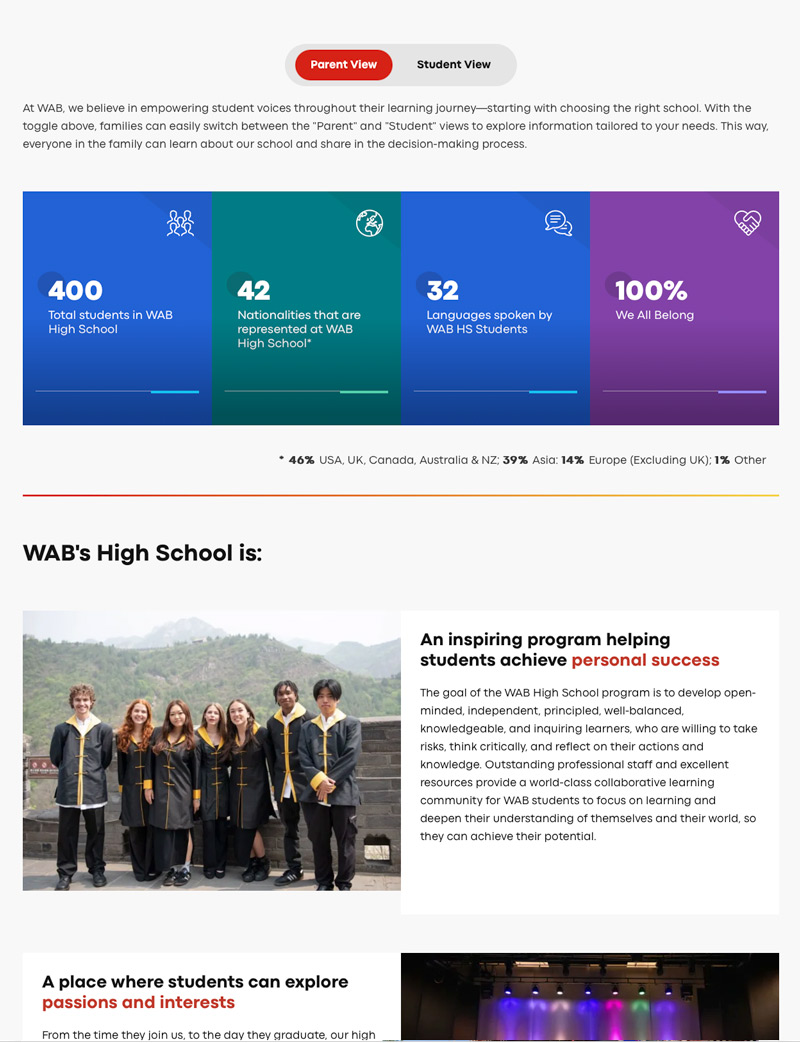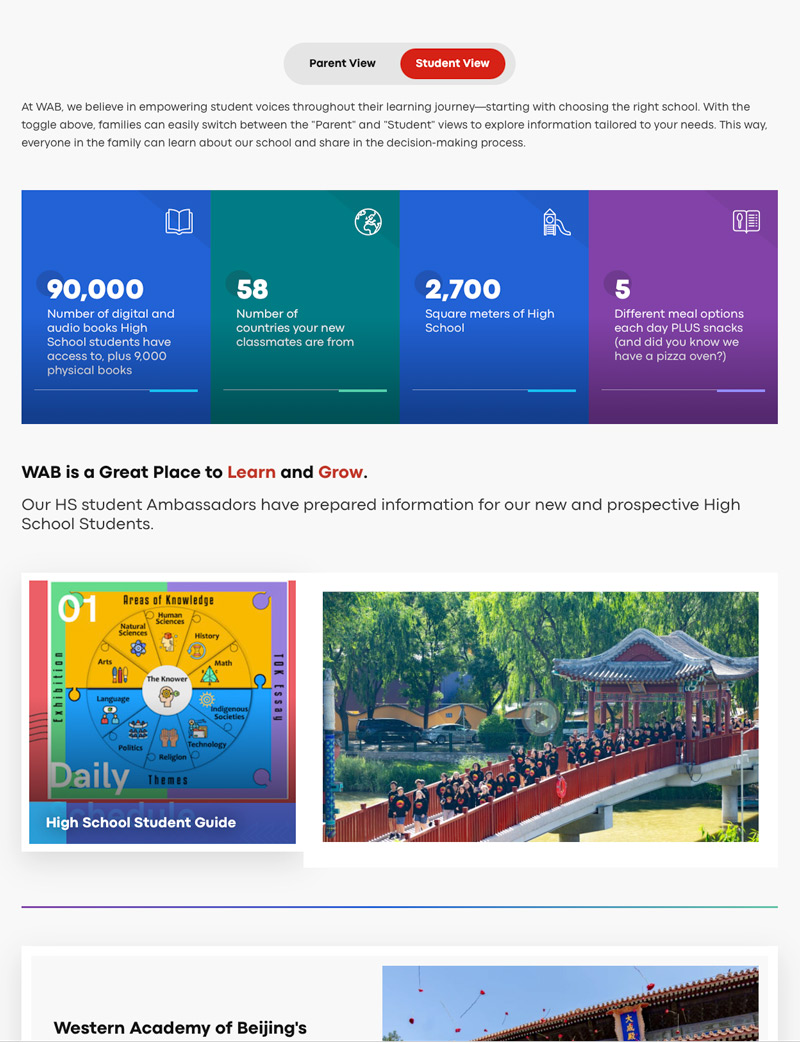Have you ever been at a party or networking event where someone dominates the conversation, only talking about themselves? Schools often make the same mistake in their marketing: focusing solely on their achievements, programs, and mission statements instead of addressing what families truly need to hear.
Even worse, many schools rely on education jargon, acronyms, and insider terminology, making it harder for prospective families—especially those unfamiliar with international schooling—to connect with their message. Some school may worry that making their communication too accessible will weaken their academic reputation, but the reality is clarity builds trust.
The solution? More empathy in school marketing.
But honestly, this isn’t easy. I struggle with it myself when trying to remove marketing and branding jargon from my own website. It’s tempting to just list services and achievements, but that doesn’t resonate with school leaders. Instead, I have to show them how it helps their situation using language they understand.
That’s what this post is about: why building empathy into your marketing will benefit your entire school community and how to start making the shift today.
How Empathy Strengthens School Marketing
You need to communicate your school’s mission, programs, and philosophies, but not at the expense of emotional connection. Empathy isn’t just a “soft skill” in school marketing. It is a strategic advantage that improves everything from messaging to community engagement.
1. Clearer Messaging for Your Community
Parents don’t just enroll their child in a school. They join a community. Messaging that reflects their aspirations, concerns, and values builds trust and makes the school feel like the right fit. Empathy ensures that communication is framed from their perspective, making information clearer, more inclusive, and more emotionally resonant.
2. Smarter Audience Targeting
Families don’t just want “high-quality education.” They have specific reasons for choosing one school over another—safety, international recognition, cultural alignment, or future opportunities. Schools often focus on what they think is important rather than what parents actually value.
Empathy helps schools identify and highlight what truly matters to prospective families, leading to more effective outreach and stronger enrollment numbers.
3. Stronger Word-of-Mouth & Parent Advocacy
Marketing isn’t just about broadcasting information. It’s about creating conversations. When schools engage in two-way communication with families, it builds trust, strengthens relationships, and encourages positive word-of-mouth referrals.
Not all parents have the same digital literacy, language fluency, or communication preferences. An empathetic approach ensures that information is clear, easy to find, and accessible across multiple channels.
4. Faster, More Effective Crisis Response
In a crisis, people want to feel heard, understood, and reassured. Schools that understand their community’s fears and frustrations can address potential concerns proactively.
A school that communicates with empathy instead of defensiveness earns trust and long-term loyalty—allowing it to navigate challenges more effectively.
5. More Sustainable Workflows for In-House Teams
Empathy isn’t just about external messaging. It also impacts how schools treat their own marketing and communications teams.
When school leadership understands the real role of marketing—not just as a service provider but as a strategic driver—it creates a healthier, more sustainable workflow. Schools with empathetic leadership see fewer last-minute marketing requests, fewer unrealistic expectations, and more strategic, intentional work.


Case Study: An Empathy-Sparked Idea
At an open house, I overheard a principal explain a key learning concept more clearly and concisely than I had ever seen on the school’s website. Speaking face-to-face with prospective parents, they naturally simplified the explanation—removing jargon and insider language to make it resonate with the audience in front of them.
That moment sparked an idea. While leading the content development process for Western Academy of Beijing’s new website, I designed a workshop where principals role-played conversations with both “parents” and “students,” refining complex learning concepts into audience-friendly messaging. The results were so effective that they became the foundation for the new website content.
From this, I proposed and led the development of the “Parent View / Student View” toggle for key learning level pages. This feature didn’t just improve clarity—it demonstrated WAB’s commitment to student voice in learning in a more authentic way than simply stating it. By recognizing students as an audience in their own right, the toggle helped ensure they had an active role in researching and choosing their next school.
Building Empathy: Where to Start
We often assume we’re being empathetic, but true empathy requires deliberate effort. The best way to strengthen audience connections is to first build personal, everyday empathy, then apply those insights at a broader level.
To do this, think about empathy in two key ways:
Micro – The small, daily mindset shifts and interactions that build stronger relationships with families and staff.
Macro – The big-picture strategies that shape school-wide marketing and communications.
When we improve empathy in individual conversations, it naturally strengthens the way we communicate at an institutional level. Here are seven ways to develop empathy in your school marketing, working from micro (individual practice) to macro (institutional strategy):
1. Define Your Audience Clearly
Micro: Talk to parents in your community. Can you identify specific values, motivations, or needs that reveal insights about your ideal audience? Do you notice common themes that could help clarify the audience best suited for your school’s outreach?
Macro: Identify your key audience groups and understand what truly matters to them. You can’t be everything to everyone, so define your ideal families, staff, and students. Develop audience personas based on real data and conversations. A well-defined persona makes it easier to create messaging that resonates.
2. Listen & See from Their Perspective
Micro: Train yourself to listen without waiting for your turn to talk. Pay attention to how others describe your school and use their language in your messaging. When speaking with parents, paraphrase their concerns to confirm understanding.
Macro: Set up focus groups, interviews, and surveys to gather real insights from your audience. Map out the journey families take—from first impressions to long-term engagement—to anticipate their evolving needs. (School ID offers custom workshops to help.)
3. Challenge Internal Bias & Assumptions
Micro: Avoid assuming that your preferences reflect your audience’s. You may be a parent at the school, but your experience is not universal.
Macro: Schools often assume they know what families want. Use data and diverse perspectives to challenge internal narratives.
4. Include Them in Your Story
Micro: Avoid being the person at a party who only talks about themselves. Let your natural curiosity guide you. Instead of just waiting for your turn to speak, ask thoughtful questions and genuinely engage.
Macro: On your school’s website, show real transformation through authentic stories. Families connect with stories more than with lists of features.
5. Slow Down & Strategize
Micro: If you’re constantly in reactive mode, your brain physically can’t engage in deep, empathetic thinking. Slow down to process and connect.
Macro: Set boundaries, plan ahead, and prioritize thoughtful communication. Overloaded teams cannot be empathetic.
6. Seek & Embrace Feedback
Micro: When receiving feedback, don’t get defensive. Instead of justifying choices, ask yourself, “How could this be perceived differently?”
Macro: Create structured opportunities for feedback—surveys, advisory groups, one-on-one meetings.
Want to Improve Empathy in Your School’s Marketing?.School ID is introducing custom empathy-building workshops for school marketing teams. If you’re attending Finalsite University Taipei, I’ll be presenting The Empathy Overhaul: Understand Your Parents, Strengthen Your Outreach. Want to bring a custom workshop to your school? Let’s connect.
More Stories:
The Empathy Overhaul Workshop
March 3, 2025
Latest News: School ID Partners with Finalsite University Taipei
February 7, 2025


